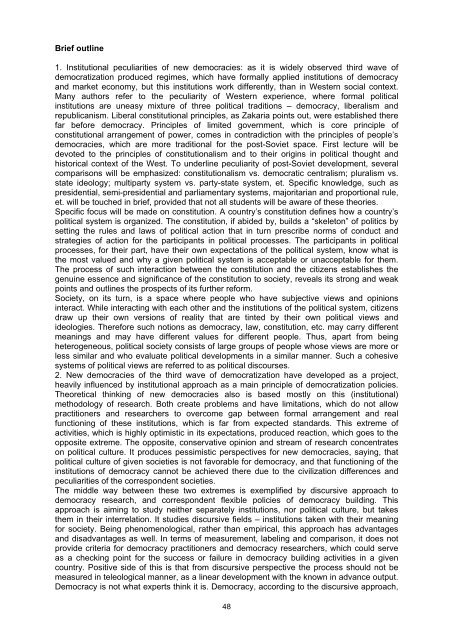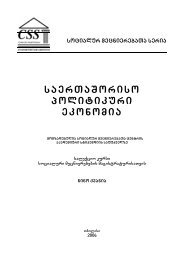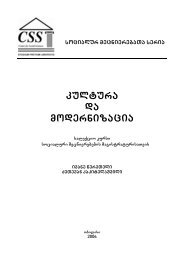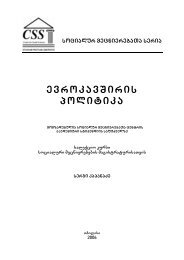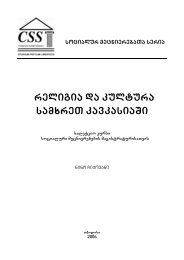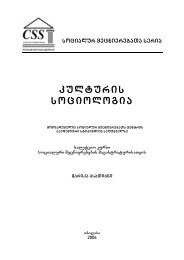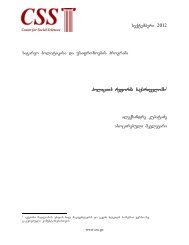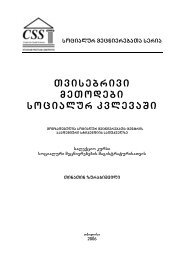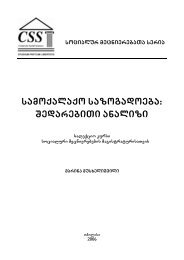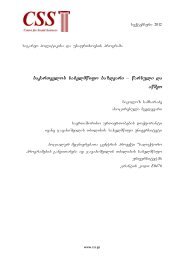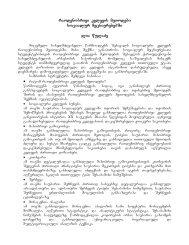Download part I - Center for Social Sciences
Download part I - Center for Social Sciences
Download part I - Center for Social Sciences
- No tags were found...
You also want an ePaper? Increase the reach of your titles
YUMPU automatically turns print PDFs into web optimized ePapers that Google loves.
Brief outline1. Institutional peculiarities of new democracies: as it is widely observed third wave ofdemocratization produced regimes, which have <strong>for</strong>mally applied institutions of democracyand market economy, but this institutions work differently, than in Western social context.Many authors refer to the peculiarity of Western experience, where <strong>for</strong>mal politicalinstitutions are uneasy mixture of three political traditions – democracy, liberalism andrepublicanism. Liberal constitutional principles, as Zakaria points out, were established therefar be<strong>for</strong>e democracy. Principles of limited government, which is core principle ofconstitutional arrangement of power, comes in contradiction with the principles of people’sdemocracies, which are more traditional <strong>for</strong> the post-Soviet space. First lecture will bedevoted to the principles of constitutionalism and to their origins in political thought andhistorical context of the West. To underline peculiarity of post-Soviet development, severalcomparisons will be emphasized: constitutionalism vs. democratic centralism; pluralism vs.state ideology; multi<strong>part</strong>y system vs. <strong>part</strong>y-state system, et. Specific knowledge, such aspresidential, semi-presidential and parliamentary systems, majoritarian and proportional rule,et. will be touched in brief, provided that not all students will be aware of these theories.Specific focus will be made on constitution. A country’s constitution defines how a country’spolitical system is organized. The constitution, if abided by, builds a “skeleton” of politics bysetting the rules and laws of political action that in turn prescribe norms of conduct andstrategies of action <strong>for</strong> the <strong>part</strong>icipants in political processes. The <strong>part</strong>icipants in politicalprocesses, <strong>for</strong> their <strong>part</strong>, have their own expectations of the political system, know what isthe most valued and why a given political system is acceptable or unacceptable <strong>for</strong> them.The process of such interaction between the constitution and the citizens establishes thegenuine essence and significance of the constitution to society, reveals its strong and weakpoints and outlines the prospects of its further re<strong>for</strong>m.Society, on its turn, is a space where people who have subjective views and opinionsinteract. While interacting with each other and the institutions of the political system, citizensdraw up their own versions of reality that are tinted by their own political views andideologies. There<strong>for</strong>e such notions as democracy, law, constitution, etc. may carry differentmeanings and may have different values <strong>for</strong> different people. Thus, a<strong>part</strong> from beingheterogeneous, political society consists of large groups of people whose views are more orless similar and who evaluate political developments in a similar manner. Such a cohesivesystems of political views are referred to as political discourses.2. New democracies of the third wave of democratization have developed as a project,heavily influenced by institutional approach as a main principle of democratization policies.Theoretical thinking of new democracies also is based mostly on this (institutional)methodology of research. Both create problems and have limitations, which do not allowpractitioners and researchers to overcome gap between <strong>for</strong>mal arrangement and realfunctioning of these institutions, which is far from expected standards. This extreme ofactivities, which is highly optimistic in its expectations, produced reaction, which goes to theopposite extreme. The opposite, conservative opinion and stream of research concentrateson political culture. It produces pessimistic perspectives <strong>for</strong> new democracies, saying, thatpolitical culture of given societies is not favorable <strong>for</strong> democracy, and that functioning of theinstitutions of democracy cannot be achieved there due to the civilization differences andpeculiarities of the correspondent societies.The middle way between these two extremes is exemplified by discursive approach todemocracy research, and correspondent flexible policies of democracy building. Thisapproach is aiming to study neither separately institutions, nor political culture, but takesthem in their interrelation. It studies discursive fields – institutions taken with their meaning<strong>for</strong> society. Being phenomenological, rather than empirical, this approach has advantagesand disadvantages as well. In terms of measurement, labeling and comparison, it does notprovide criteria <strong>for</strong> democracy practitioners and democracy researchers, which could serveas a checking point <strong>for</strong> the success or failure in democracy building activities in a givencountry. Positive side of this is that from discursive perspective the process should not bemeasured in teleological manner, as a linear development with the known in advance output.Democracy is not what experts think it is. Democracy, according to the discursive approach,48


